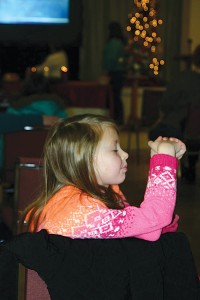After leaving — or, more accurately, fleeing — Texas following her divorce, Bryce parlayed her experience as a recreation center director into a job working with kids at an Episcopal church in Boulder in 1997. She had never been a member of an Episcopal church, but her solid church background and experience with children landed her the low-paying lay job with the title of “youth minister.” Her job involved leading a youth group; overseeing service projects, meetings, and recreational activities; and visits to other churches. She also served as assistant music minister.
Still unsettled about her sexual orientation, she sought counseling with Sara Smith, a minister at University of Colorado who’d been ordained by the United Church of Christ. She and Bryce had common friends in Fort Worth.

“We had a conversation that really gave me hope that there was a future for my faith, being gay and Christian,” Bryce said.
She and Smith stayed in touch by writing letters. Eventually they fell in love, and Bryce moved to Denver.
“Moving to Denver was essentially my coming out,” Bryce said. “That’s when I told my parents and my son.”
Her parents struggled.
“They still can’t reconcile that with their faith,” she said. “They love me … but it was very difficult for them.”
During this time, Bryce heard a calling to pursue ordained ministry. She enrolled at the Iliff School of Theology in Denver in 1999.
David, who was 12 at the time of the divorce, lived with his father in Arizona but spent about 10 weeks of the year in Colorado with his mother. Watching his parents split up had been so excruciating that the added news about his mom being gay was almost anti-climactic, he said.
“It was something that took some getting used to, but there was never any animosity or hatred,” he said. “There was a learning curve. I’d been raised in Texas, and it’s not like I was much exposed to the gay lifestyle as a kid.”
What he knew then and still knows today is that his mother deserved his love, respect, and loyalty.
“She is an amazing person, so nice and giving and intelligent,” he said. “For people to marginalize her because she is a lesbian is crazy to me, and I don’t understand it.”
In 1998, Bryce and Smith had a civil commitment ceremony at the First Congregational Church of Christ in Boulder, where Smith worked as minister. Attending were several of Bryce’s co-workers at St. Aidan’s Episcopal Church in Boulder. A minister from the church performed the union even though same-sex marriages were not legal in Colorado back then and still aren’t.
The St. Aidan’s minister had in effect condoned same-sex unions, although that sentiment ran counter to the Episcopal Church’s official stance. Bryce and Smith weren’t married at the church, but word of it reached a more orthodox priest at the national level. He accused the Boulder church leaders of approving secret protocols for same-sex unions, and a tussle broke out between the local church’s leaders and the national leaders.
The Rocky Mountain News covered the story with headlines such as “Rift over same-sex ceremonies frays Colorado Episcopal diocese; clergy exchange volleys as church weighs gay rights.”
Local church leaders eventually aligned themselves more closely with the national officials and told Bryce she would have to leave her job. However, they asked her to stay until the school year ended so her students wouldn’t be upset. In the meantime, she was told to meet with church members and allay their concerns. What unfolded felt to Bryce like a McCarthy hearing. Church members debated whether having a youth minister who was gay would lead to pedophilia or the recruitment of youngsters into gay lifestyles.
“They would grill me with all these horrible questions,” she said. “I still think I have PTSD. There was so much misinformation about being gay. It ended up being a lynch mob sanctioned by the church, and I would leave every one of those meetings just devastated, having to defend myself over and over again against the stupidest ignorance.”
When the school year ended, Bryce refused to quit. She was fired in 1999.
“Churches should be able to hire and fire whoever they want to represent their faith,” Bryce said. “I wasn’t disputing that. But you can’t have it both ways; you can’t hire somebody knowing they’re gay and then fire them for being gay.”
For her, it had become a matter of integrity. She filed a lawsuit against the Episcopal Church in the diocese of Colorado for wrongful termination, claiming the church violated her civil rights by firing her because she was gay. She had little money and relied on a fund-raiser to pay for the cost of pursuing the case. Her attorney worked pro bono.
The lawsuit eventually made its way to the U.S. Tenth Circuit Court of Appeals, which ruled against Bryce in early 2002. The court said the church was allowed to make personnel decisions based on its religious doctrine, under the First Amendment’s guarantee of religious freedom.
That same year, Bryce graduated from the multi-faith seminary and accepted a job as pastor at the Community Christian Church in Rochester, N.Y., a United Church of Christ congregation. Before she left Boulder, her students made her a pottery bowl inscribed with all their signatures and a bold message: “Celebrate Diversity.” The bowl is currently displayed on a shelf in Bryce’s Fort Worth office.
Her new congregation embraced Bryce. Community Christian Church prided itself on its open and affirming nature. Bryce felt at home, but she and Smith developed domestic troubles and split up after five years. Bryce vented her feelings in long-distance phone calls to November, a friend from Boulder. Over the next few years, they fell in love and were married in 2011 in Connecticut, a state that legally recognizes same-sex marriages. Although things are changing fast, most states, including Texas, still do not recognize such unions.
By then, Bryce had been at the New York church for 10 years and felt it was time for a new challenge. She also wanted to live closer to her son, David, who had married and settled in Dallas. November scoured the online postings.
“I found the Fort Worth one, and we were, ‘Ha-ha, like we’d go to Fort Worth, Texas, two married lesbians,’ ” November recalled. “Funny joke: Here we are.”
********












Rev. Bryce,
Brite has a Soul Repair Center if you would like to know more about helping veterans with moral injury after war.
Also, Brite offers a free lectureship series during Ministers’ week, designed for clergy to converse with others around current topics. This is February 17-20.
Respectfully,
L.Miner
Brite Divinity Student
Coleman Baker from Brite goes to First Congregational and has given talks on moral injury. Lee Ann has also given other sermons on moral injury. L. Miner, we would love to have you visit!
I spent some time in Maine. Over those years, I met some wonderful lesbian couples at my UCC church. Then their search welcomed a married lesbian minister. A second lesbian couple has now replaced them. This congregation would be the least likely to take this step but each couple won their hearts.